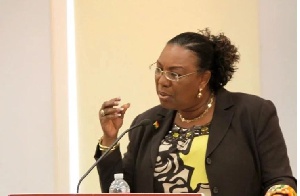 Former Attorney General Betty Mould-Iddrisu
Former Attorney General Betty Mould-Iddrisu
Betty Mould-Iddrisu, former Minister of Justice and Attorney General, has expressed her concern over the obstacles faced by students aspiring to pursue legal education in Ghana.
She finds it distressing that some lawyers, including former Chief Justices, undermine the right to legal education and place impediments in the way of aspiring lawyers.
During an exclusive interview with Korku Lumor on the Class Morning Show (CMS) on Class91.3fm, Betty Mould-Iddrisu expressed her bewilderment at the attempts to hinder aspiring lawyers from being called to the bar.
She regrets not establishing more law schools during her tenure as Attorney General, as there have been no additional law schools since then.
She said “it’s a total mystery for me on how they try to put impediments on the way of lawyers being called to the bar, I just don’t understand this. When I was attorney general, that is when we managed to open the two additional law schools in the country, it was only Makola and it hunts me, if I had known, I would have pushed for even more at that time.”
“Since my time, there hasn’t been any additional law school. I cannot understand this, I find it absolutely disturbing and a failure on the part of some of our distinguished lawyers not to see this.”
She questions the notion of law becoming a privilege and believes that legal education should be accessible to all.
“I don’t understand, where does law become a privilege?” she quizzed “where would we have had the Ollenu’s and people who came from the salt of the land. Where would we have had so many of our distinguished attorneys?”
Betty Mould-Iddrisu cites examples from countries like the UK and the USA, where legal education is not restricted to a privileged few.
She argues that Ghana should adopt a progressive approach, allowing individuals to take exams to determine their eligibility for legal education, similar to the systems in those countries.
“There’s nothing like that thinking in the UK or the USA or anything like that. In the US, go and sit a bunch of exams and see if you can make it and that’s it and that’s how it should be here. We must be progressive thinking far beyond what we have now.”
“My heart goes out to these students, I don’t know why they should suffer what they are suffering, I find it appalling that anyone can think like that including some of our former chief justices and some of them who are currently sitting on the General Legal Counsel. They must get real and move with the times,” the former education minister stated.
Betty Mould-Iddrisu disagrees with the argument that inadequate resources and qualified faculty make it challenging to provide quality legal education.
She suggests that the Ministry of Education should ensure that universities are properly licensed and equipped to deliver the necessary education and enrich the law syllabus.
Her views contrast with those of her colleague, former Attorney General Ayikoi Otoo, who believes that legal education should not be considered a right for everyone.
Ayikoi Otoo emphasises the gravity of the legal profession, stating that it deals with matters of human life and liberty.
He argues that incompetent lawyers can have severe consequences, such as wrongful convictions or loss of life or property. He draws a parallel between law and medicine, emphasizing the need for top-quality individuals in both professions.
Former Chief Justice Sophia Akuffo and former Attorney General Gloria Akuffo have also expressed concerns about maintaining high standards in the legal profession. They caution against mass production of lawyers and advocate for comprehensive examinations of the legal education system to address existing challenges.
The divergent perspectives expressed by legal professionals highlight the ongoing debate surrounding legal education in Ghana. While some advocate for inclusivity and increased access to legal education, others stress the need to maintain high standards to ensure the competency and integrity of lawyers.